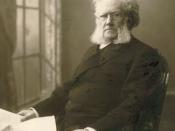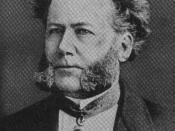IbsenÃÂs, A DollÃÂs House, is a major critique of 19th century marriage norms. At the time it was written, it caused a stir between people in society since it went against the womenÃÂs role in their marriage at the time. The remarkable thing is that in contemporary society these issues are still relevant. Nora, the wife of Torvald, is faced with a huge dilemma at the end of the play, to stay with her husband and children or destroy her and her familyÃÂs reputation and leave to find out her true self. Nora decides to leave to much of her husbandÃÂs shock and dismay. Nora, since a child, has been sheltered and treated like a doll in a dollhouse. Her life can be summed up by her living her life for others such as her dad and husband. She falls into this condition somewhat unknowingly and is forced to depart from it because of a circumstance that makes her current life worthless.
She causes this circumstance, but on the other hand, it was brought about with good faith. The debate over what her sacred duty is can be a messy one. Although both sides have a strong case against one another, NoraÃÂs sacred duty to herself wins by an inch.If Nora stays with her family she wonÃÂt be living her life as she would want to which is the problem she is faced with. On the other hand, Torvald believes that NoraÃÂs sacred duty is to her husband and children before herself. ÃÂFirst and foremost, you are a wife and motherÃÂ (Ibsen, 82). If she sacrifices herself for the sake of her children and husband, they would live their lives similarly as it were before. The key word in that sentence is similarly. They would keep their reputation of a normal family in society, but behind the scenes, they would all be conscious about NoraÃÂs acting, especially Nora. Also, her acting wouldnÃÂt be up to par as to herself before the proclamation. This, in turn,2would cause quarrel and uneasiness within the family. Since her kids are a very important factor in this matter, they would also be aware of their motherÃÂs dissatisfaction with her life. That isnÃÂt something Nora wants to portray to her kids. All in all, it would work out Hagainst the benefit of the family if Nora stays. If Nora leaves to amend her sacred duty, she would be causing her family to live in an undesirable environment. On the other hand, she would be causing an undesirable environment if she stayed. So the better option in this matter is for her to leave and amend her sacred duty since there truly is a beneficial aspect to it. Now that Nora has left her family, she has a responsibility to herself and needs to find out about herself and the real world. After she has done that, she can make the decision to go back to her family if she still feels love for Torvald and if Torvald still feels love for her. In this case, everything would bloom. The children would learn from their mother in a first hand way, and the family would continue to grow with an open-mind. If she decides not to come back or if Torvald rejects her coming back, then the children would probably make the same mistakes later on in their own homes. ÃÂWe all tend to recreate as adults what we knew as home when we were kids. If our childhood home was a war zone, then we will recreate the same environment in our homes as adultsÃÂ (Hitchcock, 1). It is also difficult to assume what would have happened if Krogstad dropped off the letter sooner. Nora would continue living the same lie but in happiness like before. Sooner or later, another instance similar to that one would arise and would cause Nora to realize that she is living a lie. ÃÂA lie has speed, but Truth has enduranceÃÂ (Mohn).
3A DollÃÂs House, proved to be a sensation when it first came out in the late 19th century. What Nora performed in the end was thought of as outrageous and appalling. Ibsen was forced to write an alternative ending in order for it to be acceptable in numerous places. Lord Chamberlain also banned the play in Britain because of its severity. In reality, Nora makes the right decision to leave her family at the end. This decision is the first step towards the truth for both her and the family. If she were to stay and abide with TorvaldÃÂs and societies conventions, the truth would always be hidden from the people who need it the most and would actually backfire on societies welfare. It is so sad that Nora and Torvald had to experience it this way, but in reality it was inevitable. It was also inevitable that a play like this would arise at this time or later. Sooner or later, someone was going to speak up against the falsehood of the marriage norms at the time. The creation of this play caused people from everywhere to redetermine their marriages and lives. This play marks a turning point in modern history of when the woman is no longer afraid to confront her husband about their problems and such. Stunningly, this issue in present-day society isnÃÂt an outdated one. Couples still have similar issues, and women especially, are still being confronted with these problems in their lives. These types of issues are obviously originated from the male dominated culture. But it is the womanÃÂs fault for not going against the manÃÂs ideologies that lead them to live their consistently bogus lives. The day men and women live with the truth is when everything will be harmonious. When the children see this, it would be reenacted in their own homes and relationships in the future.
sourcesIbsen, Henrik. A DollÃÂs House. Print.
Hitchcock, Mindy. ÃÂDivorce is as Hard on Your Kids as You Choose to Make it.ÃÂ Web. 11 Oct. 2009





